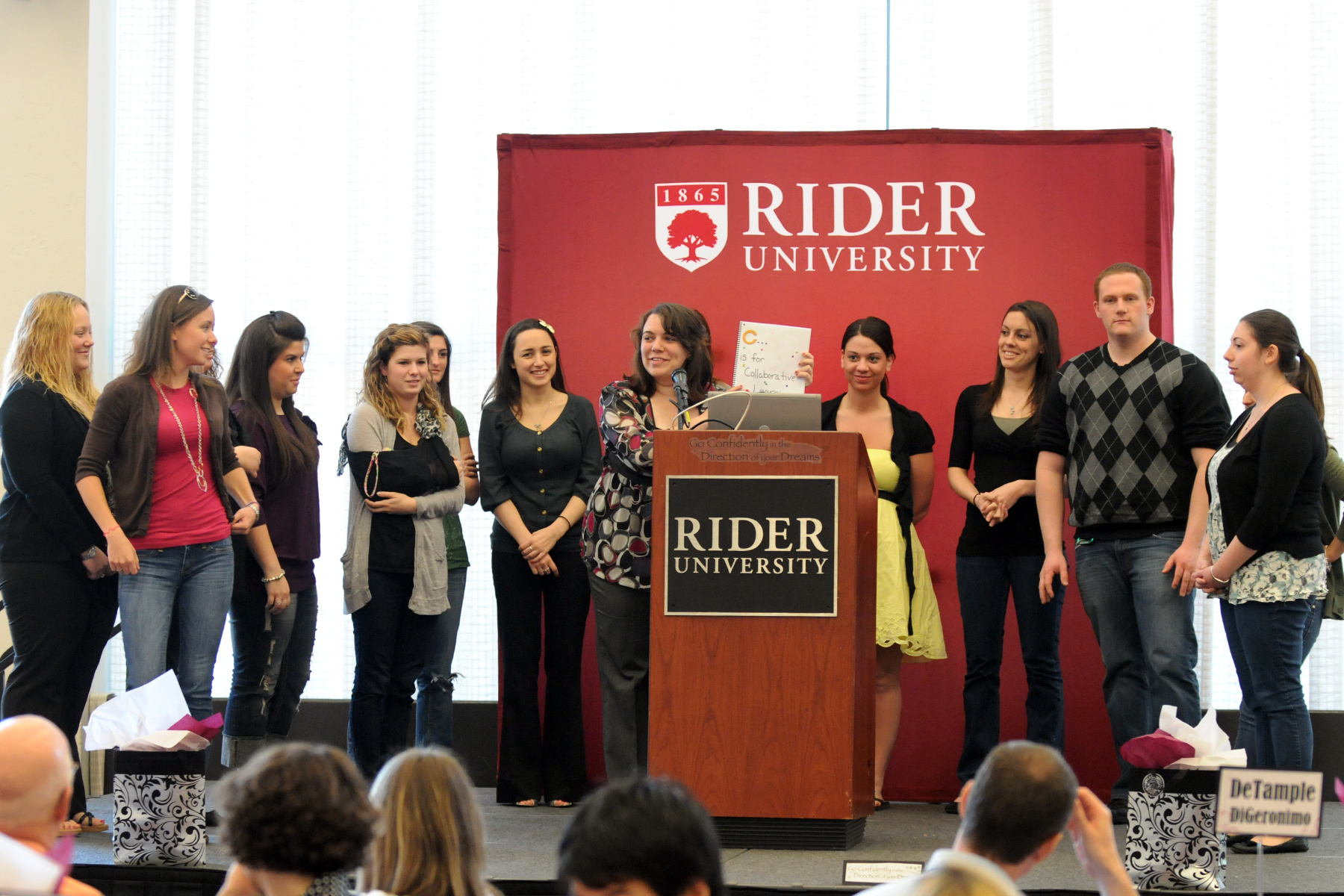Monday, Jun 20, 2011
This year, the School of Education’s Field Placement office introduced a cluster model for student teachers to learn from their peers, supervisors and schools. The new model was one of the highlights of the student teacher wrap-up celebration in May.
by Meaghan Haugh
This year, the School of Education’s Field Placement office at Rider introduced a cluster model, a new initiative that aims to better prepare student teachers for the demands of today’s educational standards and expand the development of partner schools.
As part of the model, student teachers and supervisors at elementary schools were grouped into seven clusters based on their school placements. The clusters would meet on site to discuss issues in the classroom. Since the seminars were held on site, the student teachers could use the entire school as a resource and meet with a variety of individuals, including school psychologists, guidance counselors and special education teachers.
“The clusters foster professional learning communities where peers are able to discuss and to critique each other. They also have the advantage of seeing other cooperating teachers teach, which is important, because teachers have different styles,” explained Dr. Suzanne Gespass, director of Field Placement. “We know what is important for students, especially new standards that call for collaboration, self-reflection and best practices. We think we can do all of these things through this cluster site model.”
The new initiative helped highlight the one-day student teacher wrap-up celebration on May 6 in BLC Cavalla Room, where more than 170 graduating students, who recently completed their student teaching requirements, were lauded for their dedication and welcomed to the teaching profession. Each semester, the School of Education holds the one-day event for student teachers.
Suzanne Carbonaro, NCATE assessment coordinator, said the wrap-up celebration gives student teachers a chance to showcase what they have done in their seminars and classrooms through discussion videos and skits. Responding to the current state of education and the government’s push for reform, the School of Education has placed an emphasis on teacher performance and assessment.
“We want our student teacher candidates to be aware of assessment as it relates to planning lessons to help students learn. Today’s event celebrates what our student teachers have accomplished and launches them into today’s classrooms as teachers,” Carbonaro said.
Melissa Mulrine ’11, who recently received bachelor’s degrees in Elementary Education and Psychology, student-taught first grade at Maurice Hawk School in West Windsor, N.J. Mulrine was placed in a cluster of five student teachers, who would meet once a week in West Windsor.
“It was a really great learning experience,” said Mulrine about student teaching. “This event is a great way to wrap up the semester and gain advice about going forward in our careers. I feel very prepared, especially after student teaching.”
In addition to meeting on-site, students in the clusters were also assigned to develop and implement projects that would enhance their school communities. Projects ranged from organizing books by level in classroom library and promoting an understanding of English-language learners to creating an art gallery and developing reading and writing programs.
“These students have worked very hard over the course of 15 weeks. They are tomorrow’s teachers,” said Sue Ellen McConville, assistant director of Field Placement. “Through these clusters, we are teaching teachers that they are leaders. It’s not just administrators. It’s model team building. We are teaching how to work as a team for one outcome.”
Amanda Matticks ’11, who recently received bachelor’s degrees in Elementary Education and Psychology and was named one of this year’s recipients of the President’s Award, student taught at Millstone River School in West Windsor. There, she taught a general education fourth-grade class for six weeks and a fourth- and fifth-grade resource room for six weeks.
“As a student teacher, having a good supervisor is really key. My supervisor, Sandy Romero, was amazing. She had really good feedback and encouraged me,” Matticks said.
That type of encouragement and preparation plays an integral role in the success of student teachers.
“Candidates preparing to work in schools as teachers need to know and demonstrate strong understanding of the content they plan to teach and be able to provide multiple explanations and instructional strategies so that all students learn,” explained Sharon Sherman, dean of Rider’s School of Education. “The student teaching experience provides that opportunity to our students as they work with their mentor teachers and receive guidance from our expert supervisors. That’s part of what makes the Rider experience so strong.”

